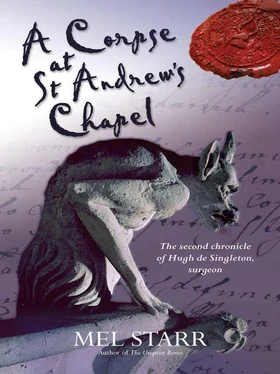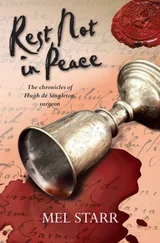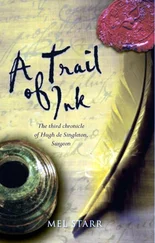Mel Starr - A Corpse at St Andrew's Chapel
Здесь есть возможность читать онлайн «Mel Starr - A Corpse at St Andrew's Chapel» весь текст электронной книги совершенно бесплатно (целиком полную версию без сокращений). В некоторых случаях можно слушать аудио, скачать через торрент в формате fb2 и присутствует краткое содержание. Год выпуска: 2010, Издательство: Kregel Publications, Жанр: Исторический детектив, на английском языке. Описание произведения, (предисловие) а так же отзывы посетителей доступны на портале библиотеки ЛибКат.
- Название:A Corpse at St Andrew's Chapel
- Автор:
- Издательство:Kregel Publications
- Жанр:
- Год:2010
- ISBN:нет данных
- Рейтинг книги:5 / 5. Голосов: 1
-
Избранное:Добавить в избранное
- Отзывы:
-
Ваша оценка:
- 100
- 1
- 2
- 3
- 4
- 5
A Corpse at St Andrew's Chapel: краткое содержание, описание и аннотация
Предлагаем к чтению аннотацию, описание, краткое содержание или предисловие (зависит от того, что написал сам автор книги «A Corpse at St Andrew's Chapel»). Если вы не нашли необходимую информацию о книге — напишите в комментариях, мы постараемся отыскать её.
A Corpse at St Andrew's Chapel — читать онлайн бесплатно полную книгу (весь текст) целиком
Ниже представлен текст книги, разбитый по страницам. Система сохранения места последней прочитанной страницы, позволяет с удобством читать онлайн бесплатно книгу «A Corpse at St Andrew's Chapel», без необходимости каждый раз заново искать на чём Вы остановились. Поставьте закладку, и сможете в любой момент перейти на страницу, на которой закончили чтение.
Интервал:
Закладка:
We broke our fast with loaves hot from the kitchen and ale. The ale was not fresh, and near sour. Rather like my mood. For this Master John apologized. For the ale, I mean, not my mood.
“Fare you well, Hugh. When you have solved these mysteries I would hear of it.”
“You may credit too much, Master John. You assume I will find a murderer and a poacher.”
“I am a man of faith. What is it the Holy Scripture says of faith? ’Tis ‘the substance of things hoped for, the evidence of things not seen.’”
“Aye, well, there is much I do not see and therefore must hope for.”
“Because there is evidence not yet seen does not mean you will never see it. As the apostle wrote, ‘now we see through a glass darkly, but then, face to face.’”
“The glass is surely dark. That much is true.”
“Be of good cheer, Hugh. You are too solemn. You think too much of failure. Look rather at your success. All men fail on occasion. ’Tis our nature. Only the Lord Christ was perfect in all things. And consider that what seems failure this day may become success tomorrow or next day. You were much perplexed about the bones found in the castle cesspit, were you not?”
“Aye.”
“But time and wit found the answer.”
“And perhaps the grace of God, who looked on my feeble effort and chose to lead me through the maze.”
“He does that, when we ask. Even, betimes, when we do not think to ask.”
The scholar’s words brought to mind the times I sought guidance. I nodded agreement. It is difficult to disagree with Master John.
“So before you are off to Bampton let us beseech God to grant you wisdom and success in this business.”
Perhaps I expected a scholar’s prayer to be filled with flowery language and erudite references. Master John spoke as if a third man sat with us in his chamber. A friend. A friend with authority, to be sure, but a beloved companion, rather than a great lord at whose feet we must tremble.
Wyclif’s prayer requested two things: that God would grant me wisdom to find truth, and courage to do truth. What more does any man need? A man may want much more than these. I want more. But my needs and my wants, Master John saw, were different matters.
I breathed “Amen” along with Master John when he finished his petition. And silently added a request for one of my wants: a good wife. I admit it; this request accompanied an image in my mind’s eye of Kate Caxton. A year before the image would have been Lady Joan Talbot. I was startled to consider that Lady Joan had not entered my thoughts for many weeks. Since near the time I met Kate.
How many other young men, I wonder, have breathed a similar prayer with the stationer’s daughter in mind? They cannot all be answered. Well, yes, they will be; but the answer for most will be “No.” Will my plea be among those? It surely was when I made similar appeal to God regarding Lady Joan.
A want? No, a need. God himself decreed that it is not good for a man to live alone and so made a helpmeet for him. I must adjust my thinking and my prayers and request our Lord that he provide for my need, not merely for my desire.
Chapter 16
Bruce neighed and stamped his great hooves when I approached his stall behind the Stag and Hounds. At home in Bampton the old horse was put out to grass in the west meadow most days. No doubt he found his stay in Oxford boring; the day spent staring at stable walls of wattle and daub.
Bruce’s iron-clad hooves echoed loudly as we clattered across the Oxpens Road Bridge. In the water meadow to the west of the river teams of men moved across the field, scythes swinging rhythmically as they worked at hay-making. Behind the men women and older children followed, raking and turning the new-cut hay so it would dry evenly. This was a good year for hay-making. There would be fodder for beasts next winter, so long as the rains did not rot the hay on the ground before it could be dried and stacked.
This scene was repeated at Aston. There the meadows were cut and the scythe work near done for the day when Bruce ambled past. Villeins were stacking hay on their scythes to carry off for their own animals. A curious custom, unknown in Lancashire, from whence I come. Here in the south of England a man may carry off so much of the lord’s hay as he may stack on his scythe when the day’s work is done. But if the scythe or hay touch the ground the hay be forfeit. I watched Lord Doilly’s reeve as he watched to see no hay grazed the ground. Some men staggered from the meadow with truly astonishing mounds of hay heaped upon their scythes.
As I completed my journey I shifted in the saddle so as to bring a different portion of my rump in contact with the hard leather. The movement brought the point of the dagger in contact with my leg. ’Twas too dark when Master John gave it to me to see it well, and I’d not taken time to examine it in the morning. I did so as Bruce shuffled the last short distance from Aston to Bampton.
The blade was well kept and sharp, and near as long as my forearm from elbow to wrist. No jewels ornamented the hilt. This was not a rich gentleman’s weapon. But a coil of bronze wire circled the haft. This was decorative more than useful. The weapon was perhaps the property of some merchant’s son. It suited my station and need. I slid it back under my belt, came near to pricking my thigh, and resolved to see the castle harness-maker about a sheath for the weapon.
The spire of the Church of St Beornwald is visible even before one reaches Aston. I enjoy my travels, especially when a conversation with Master John Wyclif — or Kate Caxton — is the purpose. But each time I approach Bampton and see that stolid spire I am reminded of what a pleasant place it is.
Ah, you say, but what of murderers and poachers and those who attack a man in the night? I suppose most towns have their miscreants. Else the king would need no sheriffs and lords no bailiffs. Bampton has its share of good men, as well. Hubert Shillside, John Prudhomme, John Holcutt, and Lord Gilbert himself. And good women, too: Matilda, Alan’s widow, the child Alice, and until she became the Lady de Burgh, Lady Joan, who once mended the torn hem of my cloak, unhindered by her station — though her brother, I think, thought it unseemly.
I was — as had become my custom — late for dinner. Bruce covered the ground at a contented, ambling pace. So long as the old horse reached Bampton Castle in time for his own bucket of oats he was unconcerned regarding my growling belly.
I took from the kitchen a loaf and a cold capon and ate in my chamber while I considered paths I could follow which might lead to a resolution of my perplexity.
Two issues vexed me: who murdered Henry atte Bridge in the north wood, and who was poaching Lord Gilbert’s game?
I decided that day to attend the poaching business first. I thought ’twould be easiest to solve. What I did not know then was that the discovery of a poacher would lead to discovery of a murderer. Had I sought first a murderer I might never have found either a killer or a poacher.
Although I wore the dagger at my hip, the steel seemed rather to strengthen my backbone. I went to my chamber the evening of the next day resolved to spend the night behind the broken-down church wall at St Andrew’s Chapel. I would learn who approached the chapel so late at night, why he did so, and what was in his sack.
I was become accustomed to slipping over the castle wall at night. I worried that this familiarity might cause me to grow careless, so crept slowly through the shadows ’til I reached the place along the north wall I favored for the purpose.
I wore brown chauces and a dark grey cotehardie, to blend with the night. But I worried that face and hands might give me away when the moon rose, so applied a thick dusting of ashes from my fireplace to the offending skin. I was satisfied with the result.
Читать дальшеИнтервал:
Закладка:
Похожие книги на «A Corpse at St Andrew's Chapel»
Представляем Вашему вниманию похожие книги на «A Corpse at St Andrew's Chapel» списком для выбора. Мы отобрали схожую по названию и смыслу литературу в надежде предоставить читателям больше вариантов отыскать новые, интересные, ещё непрочитанные произведения.
Обсуждение, отзывы о книге «A Corpse at St Andrew's Chapel» и просто собственные мнения читателей. Оставьте ваши комментарии, напишите, что Вы думаете о произведении, его смысле или главных героях. Укажите что конкретно понравилось, а что нет, и почему Вы так считаете.












